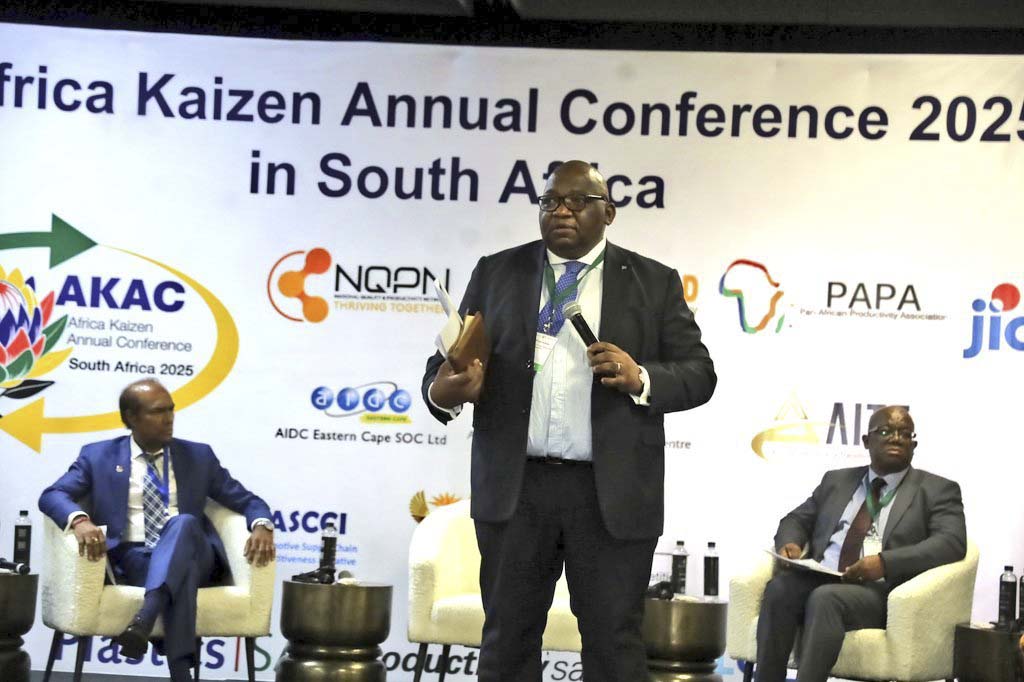The Kaizen – a Japanese philosophy of continuous improvement that involves making small, incremental changes across an organisation to increase efficiency, quality, and productivity, holds significant importance for efficiency improvements in the different sectors of the economy, including the Black Industrialists Programme and other South African transformation initiatives. This is according to the Acting Deputy Director-General of Sectors at the Department of Trade, Industry and Competition (the dtic), Dr Tebogo Makube.
Makube was setting the tone for the panel discussion on the evidence-based policy making and programme implementation at the Africa Kaizen Annual Conference (AKAC) in Boksburg, Gauteng. The theme of the conference was African Industrialisation through Fostering Competitive Firms and Value Chains on the Continent.
The session brought together leaders and practitioners of Kaizen Institutions and National Productivity Organisations on the African continent including a network of entities that promote quality and productivity improvement activities across the country, known as the National Quality and Productivity Network (NQPN).
According to Makube, Kaizen is crucial for supporting supplier development and integrating emerging suppliers into Original Equipment Manufacturers’ (OEMs) value chains. Moreover, Makube said Kaizen is a continuous productivity improvement programme that can be replicated across various economic sectors, particularly those targeting exports like agro-processing, plastics and textile, as well as their overall role in informing policy decisions.
“While we have observed improvement in the manufacturing sector, its contribution to the economy has stabilised around 12-13% over the years up from 11 and 12 %, that is an indication that we have done better with regards to improvements, necessitating enhancements in quality, productivity and the adoption of new technologies, such as the electric vehicle programme in the auto industry, aimed at producing cars for exports,” said Makube.
Makube further reiterated that, Kaizen ensured that suppliers deliver quality products. Quality, in turn, builds trust and is fundamental to effective brand management. He added that challenges extend beyond financial aspects, emphasising the role of quality in business survival.
The Head of Human Capital Development at the Ministry of Economy and Finances in Burkina Faso, Ms Esther Marie Renee, said while the African industrialisation fundamentally required increased productivity, sustained innovation, and the resilience of companies, Africa must take advantage of the digital economy.
She described the digital economy as essential for teasing out accurate information on Kaizen’s impact, enabling evidence-based policy development, and improving operational efficiency through enhanced productivity, cost reduction, waste reduction, and reduced absenteeism.
The Executive Director of National Productivity and Competitiveness Council (NPCC), in Mauritius, Dr Vinaye Ancharaz concurred with Renee’s views and added that artificial intelligence was the future of smart manufacturing, with the capabilities of accuracy of Kaizen activities.
The conference highlighted geopolitical tensions and stiff tariffs, mainly from the United States of America, which have led to significant negative impact on businesses, including component manufacturer closures and job losses. Delegates emphasised the critical need for developing regional value chains to industrialise the African continent and enable businesses to compete globally.
Kaizen was highlighted for its significant role in promoting localisation, developing black industrialists, and driving transformation in the automotive value chain in line with the South Africa’s Automotive Master Plan objectives. Given rapid technological advancements, digitalisation must be infused into Kaizen implementation.
The AKAC will be followed by the Africa Kaizen and South African National Productivity Awards, hosted by Productivity SA tomorrow 28 October 2025. The awards, will recognise organisations and productivity practitioners that have demonstrated excellence in Kaizen and productivity improvement across the continent.

The Acting Deputy Director-General of Sectors at the Department of Trade, Industry and Competition (the dtic), Dr Tebogo Makube.
Media Enquiries
Bongani Lukhele – Director: Media Relations
Tel: (012) 394 1643
Mobile: 079 5083 457
WhatsApp: 074 2998 512
E-mail: BLukhele@thedtic.gov.za
Issued by: The Department of Trade, Industry and Competition (the dtic)
Follow us on X: @the_dtic
https://www.facebook.com/thedti?mibextid=ZbWKwL
https://www.youtube.com/@thedtic

